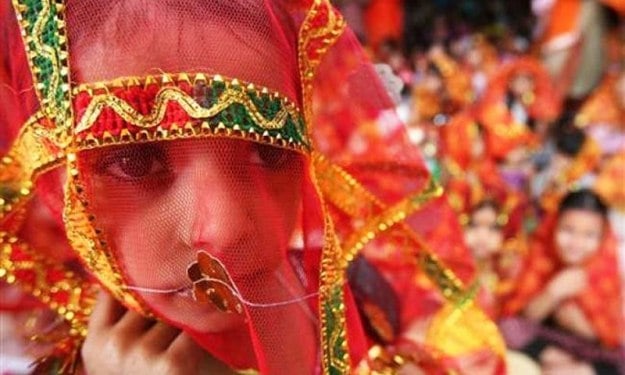ISLAMABAD:
The Council of Islamic Ideology (CII) has rejected a bill that bans marriage under the age of 18 in Islamabad, describing it as un-Islamic. The council has also declared the Child Marriage Restraint Bill 2025, presented by the Khyber Pakhtunkhwa (K-P) government, in conflict with Shariah.
A meeting of the CII was held on Tuesday chaired by Dr Raghib Hussain Naeemi.
According to the statement issued after the meeting, the council discussed the bill presented by MNA Sharmila Faruqi of the PPP and passed by the National Assembly on May 17.
The bill was introduced with the object to curb, discourage and eventually eradicate the concept and phenomenon of child marriages. It said no Nikah registrar shall register a marriage where one or both the contracting parties are below the age of 18 years.
It stated that whoever contravened with or failed to comply with sub-section (1) and (2) of the bill shall be liable to be punished with simple imprisonment for a term which shall not be more than one year and with fine amounting to Rs100,000, or both, unless he proved that he had reason to believe that the marriage was not a child marriage.
The bill sought further punishment for male adults above 18 years of age marrying a child. “Whoever, being a male above eighteen years of age, contracts a child marriage shall be punished with rigorous imprisonment which may extend to three years but shall not be less than two years and shall be liable to fine,” it said.
The CII noted that the clauses defining marriage under the age of 18 as sexual assault and prescribing punishments do not align with Islamic injunctions. The statement clarified that the bill to prohibit child marriage was not referred to the CII for review before legislation.
The council also found the Child Marriage Restraint Bill 2025 submitted by the K-P government to be in contradiction with Shariah.
The CII emphasized that thalassemia testing before marriage should be optional, not mandatory, adding that, according to Islamic teachings, marriage should be kept free from unnecessary complications.
The council also expressed concern over the irresponsible reporting of court decisions. It clarified that forcing the bride’s family to provide dowry items is contrary to Islamic teachings.
The statement also said that women should have the right to choose whether to keep the domicile of their husband’s area or that of their parents after marriage.
It ruled that after the completion of iddat — the mandatory waiting period — the husband is not financially responsible for the divorced wife. In Islamic Shariah, iddat is also observed in the event of the husband’s death.
The CII also proposed amendments to Clause 7 of the Muslim Family Laws (Amendment) Bill 2025, which was referred to it by the Ministry of Religious Affairs, and formed a committee to draft a new version of the law.
The meeting also considered questions received from the National Accountability Bureau (NAB), as well as issues related to mudarabah (Islamic finance), housing schemes, and investment matters.


